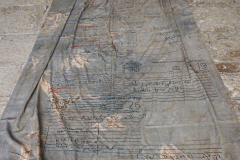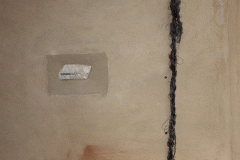Tsarsi Hammam (Mytilene-Lesvos island) is hosting Giota Andriakaina’s exhibition entitled “Why don’t you eat okra, Michalis?”.
The visitor is welcomed by three portraits made of small balls of thread. Last year, in April, these same pieces were exhibited in Thessaloniki, hosted by OTE’s showcase. The thread-made portraits were installed in the city centre while drivers were honking before the lights had turned green, while waiters were picking up the glasses before customers had finished their drink, and while quirky passers-by were talking incessantly despite the absence of interlocutors.
The artist asked all those who paused for a moment while passing by and those who pressed their nose against the window, to make a statement for each one of the characters, the old lady, the young woman and the little girl. What would they say if they were given a voice? And if they could hear, what they would they like to be said to them?
This is how the game of conversation between the spectators/passers-by and the artwork started. This game gave voice to the portraits and enlivened the public.
Those who participated wrote a note on whatever material that was available – on paper bags, on restaurant napkins, on half-empty packs of cigarettes, on pages of school textbooks, on university notebooks, on corner shop receipts, on medical prescriptions.
These peculiar pieces of writing, printed on fabric and sewed together were the raw material used for the artwork exhibited in Tarsi Hammam. The fabric-made portraits have been created by the scraps from the Thessaloniki project.
– You’re all grown up / I am really sorry, madam/ How can I help you/ Just let me know if I can/ Hang in there/ Who has died in your family/ You’re very old/ You’ve lived your life/ You scare me a lot
– I was born and made by wool/ What day is today / How did we come to this/ I wish life would give me a second chance/ I have decided to sell my family land / I’m having a hard time/ Why don’t you eat okra, Michalis?
– Mum, I want you to pay attention to me/ Don’t watch so much telly/ This is your good side/ You are very strange/ Why are there threads hanging from you?
– I’m alone/ This is so unfortunate/ I’m tormented/ When you get older you will understand what I’ve been through for you/ They are coming after us again/ I am a refugee/ Where is my child?
The artwork exhibited in Tarsi Hamman invite the visitor to listen and to hearken. Short phrases, few words, succinct sentences. The poetic notes composing the fabric-made, patchwork portraits are anything but wordy.
Affectionate, petty bourgeois clichés (there are no limits to family love), gastronomical suggestions for culinary economics (Why don’t you eat okra, Michael), humble offers of help from sympathisers (How can I help), hard-hearted criticism from angry, spoiled, tough-raised and deprived youth (You’re old, you have lived your life), and hilarious one-liners comparable to Beckettian paradoxes (Beautiful ears! Do you sell goalkeeper gloves?) – these are a few of the verbal instances used by Giota Andriakaina to construct the soundscapes of this exhibition. Installed in the premises of this complex, the artwork welcomes the visitor amidst a pandemonium of voices and sounds from the sidewalks.
This August, every room in Tarsi Hammam narrates a small chapter from the micro-history of the Greek crisis, thus preserving the poetics of everyday life.
Phrases from the field of practical life are freed from performative use and live a short poetic life, whose sole purpose is the game of sociability and communication.
Each portrait defines a liminal space where the popular and the literary, the ordinary and the exceptional, the everyday and the poetic are met without shedding their distinctiveness.
The artwork exhibited in Tarsi Hamman in August is both an artistic event and a testimony. It attempts to trace the poetic elements springing in everyday speech, like Saxifrage, the rock flower in William Carlos Williams’ poem.
Let the snake wait under
his weed
and the writing
be of words, slow and quick, sharp
to strike, quiet to wait,
sleepless.
— through metaphor to reconcile
the people and the stones.
Compose. (No ideas
but in things) Invent!
Saxifrage is my flower that splits
the rocks.
- William Carlos Williams



